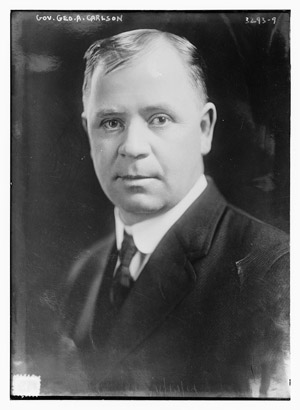Our series on Colorado’s governors continues with George A. Carlson, Colorado’s 20th governor. Governor Carlson served one term from 1915-1917. As part of the State Publications Library’s effort to digitize governors’ addresses, Governor Carlson’s inaugural address and biennial address are available in our digital repository.
Early life

George Carlson was born in Alta, Iowa in 1876 to Swedish immigrants. His family moved to Colorado when Carlson was around five years old and settled in a suburb west of Denver. He graduated from the Colorado State Normal School in Greeley and went on to complete both an undergraduate degree and a juris doctorate from the University of Colorado. He opened a private law office in Fort Collins soon after finishing his education.
Carlson married his first wife, Rosa Lillian Alps, in 1906 and raised four children with her. After Rosa’s death in 1922, he married Louise Avery Crose, with whom he had one daughter.
Political career
Carlson’s political career began when he was elected attorney general for the Eighth Judicial District in 1908. He was still serving in this capacity when he ran a successful campaign as the Republican candidate for governor in 1914. He was inaugurated on January 12, 1915. His inauguration speech to the General Assembly was influenced by the growing Progressive reform movement and focused on resolving labor disputes that had led to violent clashes like the Ludlow Massacre, and implementing the Prohibition amendment that had been approved by voters in the November 1914 election.
Carlson made good on both inauguration promises. In order to improve labor conditions in Colorado, he aided the passage of a Workmen’s Compensation law and facilitated the creation of the Industrial Commission of Colorado. This Commission was given the authority to investigate the labor conditions that led to strikes and arbitrate disputes between employees and their employers. You can read reports from the Industrial Commission from 1915 to 1964 in our digital repository.
In 1916, Colorado became a dry state four years ahead of the national prohibition law. Article XXII – Intoxicating Liquors was added as an amendment to the Colorado Constitution after voters approved the measures with 52% of the vote. Carlson advocated for the strong enforcement of this new law, although the “dry laws” eventually became difficult to carry out and led to corrupt law enforcement practices.
In his biennial address in 1917, Carlson left his role as governor with optimism for the state’s future and “confidence in Colorado and the character of her citizenry.”
Life after politics
Carlson lost his reelection campaign and left politics to resume his law practice in Denver. He died in 1926 and is buried in Greeley’s Linn Grove Cemetery.
- Colorado’s Governors: Ralph L. Carr - July 11, 2025
- Celebrating Colorado’s immigrant heritage - June 27, 2025
- Colorado’s Scenic and Historic Byways: Guanella Pass - June 6, 2025